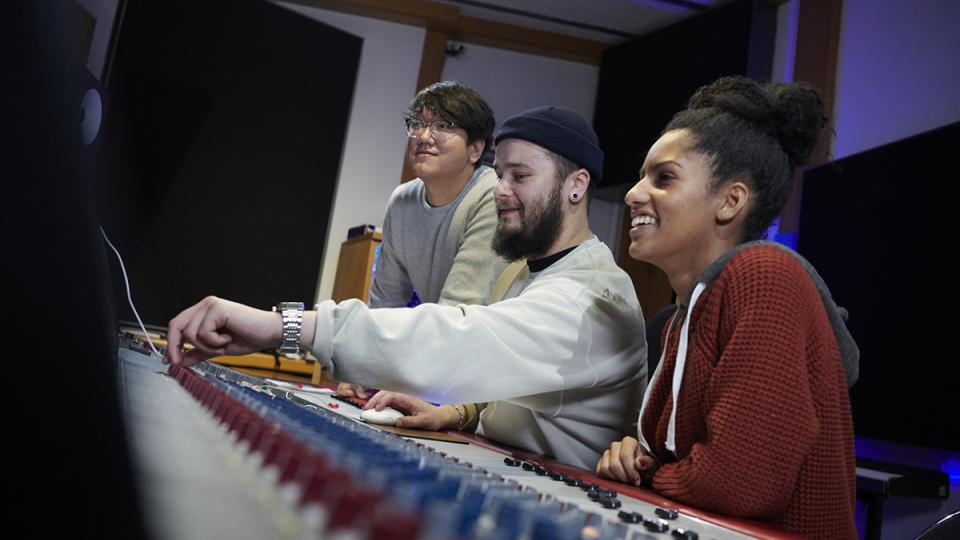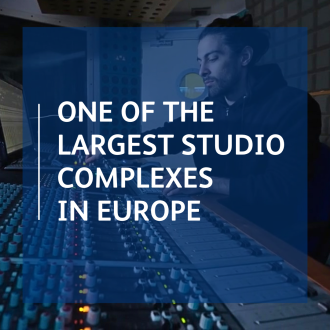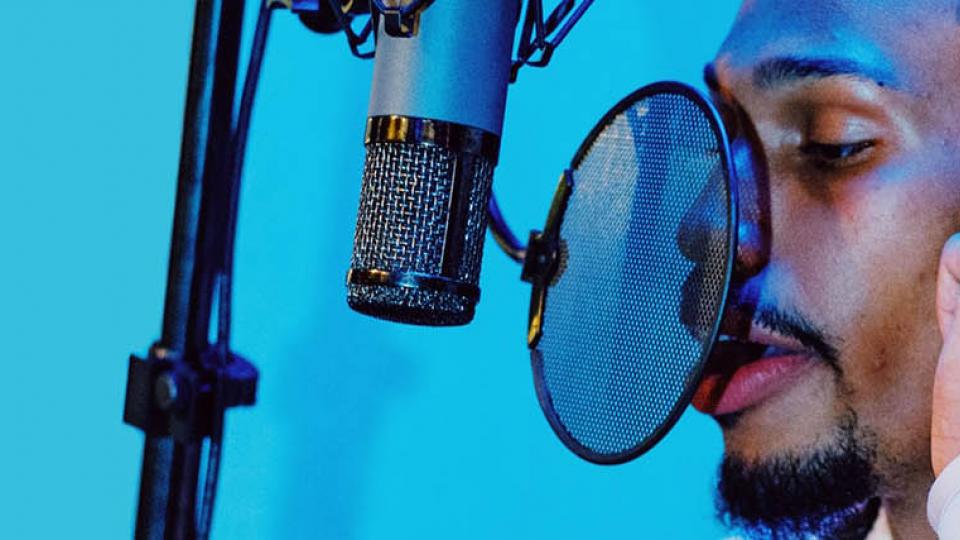- Undergraduate
Sound and Music for Gaming BA (Hons)
Overview
Why study at the University of West London?
- Ranked 30th university in the UK - The Guardian University Guide 2025
- Our Music courses are ranked #2 in London for modern universities* - Guardian University Guide 2025
- Number 1 London university for overall student satisfaction - National Student Survey 2024**
- Best university for Student Experience and Teaching Quality in the UK - The Times and Sunday Times Good University Guide 2024
BA (Hons) Sound and Music for Gaming will inspire you to become an innovative and creative professional. The games industry is experiencing huge growth.
Based in Ealing, West London, the Sound and Music for Gaming degree combines practical and vocational skills allowing you to develop hands-on approaches and creative enterprise.
Throughout the course, you will:
- Enjoy access to one of the largest audio complexes in Europe
- Discover how to capture, manipulate and produce audio for games
- Study essential concepts of middleware, studio and game audio production
- Explore new industry trends and directions
You will also focus on developing a portfolio showcasing a diverse range of skills integrating middleware, sound design, composed music, audio post-production, studio recording skills and Dolby Atmos surround sound mixing.
Additionally, you will learn from a highly experienced lecturing team that has composed for AAA game titles such as Chains of Fury (2023), H1.Jack (2022), Futurust (2022), and on Marvel’s Guardians of the Galaxy (2021).
Their original sound and music has seen them win a host of accolades for game soundtracks, including Cannes Lion Gold Awards, One Show Awards and BAFTA Nominations.

Select your desired study option, then pick a start date to see relevant course information:
Start date:
If your desired start date is not available, try selecting a different study option.
Why study Sound and Music for Gaming with us?


What our students say…
The lecturers are fantastic and I don't think I would get as many work experience opportunities at any other university.




Course detail & modules
Designed to help you flourish in the exciting games industry, our BA (Hons) Sound and Music for Gaming degree offers a comprehensive grounding in:
- middleware/DAW implementation
- creative sound design
- music for gaming
- recording studio and mix production skills.
The course modules are designed to nurture your creative potential and individual artistic identity. The course has been designed from the ground up, using industry input to prepare you with the skillset (and mindset) to succeed in this industry.
You will also benefit from interaction with industry practitioners who have designed BAFTA/Cannes Lion Award/Apple Top Ten award-winning game audio.
Added value collaborations include studying with VFX and Gaming students. At the same time, you will also work closely alongside film and audio post-production, allowing you to develop a portfolio with a range of skills and vocational outputs.
Finally, the course involves a range of guest speakers to offer you invaluable networking opportunities and the chance to immerse yourself in the vibrant world of London game audio production.
Compulsory modules
-
Audio Production for Games
Capture, manipulate, produce game audio.
-
Introduction to Professional Practice
-
Audio Workshop
Essential concepts of studio and game audio production.
-
Soundtrack Analysis
The Aesthetics & Development of Game Audio, genres, styles, history and evolution of gaming.
-
Portfolio Development
Focus on the development of a portfolio career. Through a diverse range of skill sets in writing styles, technique, arrangement, production and the ability to expand a client base and income streams.
-
Game Engine Environments
Introduction to middleware software & creative coding in gaming contexts.
Compulsory modules
-
Recording Music
'Recording music' is an advanced-recording subject designed to develop the required skills to operate both physical and virtual recording technology to a higher standard. Students will engage in a combination of practical and theoretical workshops aimed at developing a fluency in recording planning and practice. The module aims to further develop students’ abilities to critically evaluate, and confidently produce musical recordings in a chosen style.
-
Intro to Audio Post Production
An overview of audio post-production theory, practice and technologies, their use and applications. The module aims to give students a near real-world experience by carrying out project work in a departmental group situation.
-
The Evolution of Sound for Games
A historical and contextual overview of game sound and music with an emphasis on a research project.
-
Sound and Music for Screen
The module is putting the student in the role of a ‘Sound Designer’ and ‘Composer’, an increasingly important role in the life of the audio post-production and music freelancer. This module should serve as a springboard for students to proactively engage in this field. By the end of the module students will have created a body of sound and music to picture work, which can serve as an industry standard tool to promote their work with other film makers and content producers to work to near professional workflow standards and circumstances, reflective of current industry practice.
-
Creative Sound for Games
Gaming is a fast growing and lucrative area of the entertainment industry. By the end of the module you will have a solid appreciation of the power of audio for games, combined with the skills to develop audio assets and implement them in middleware. This in turn will form the basis of a show-reel which can be used for future promotion and collaboration within the gaming industry.
-
Soundtrack Composition
Non-linear sound design, implementation and creative application of audio in a middleware context.
Compulsory modules
-
Interactive Sound & Music for Gaming
(immersive audio, surround formats, implementation)
-
Experimental Sound
In this module, you will have to design an experiment that generates an audio experience. You will have the freedom to explore and develop individual ideas and abilities in the context of sound, producing a portfolio that shows confident expression and creative risk-taking, but with technical accomplishment.
-
Non-Linear Soundtrack Production
Compositional techniques with a focus on interactivity and in game implementation.
-
Mixing for Audio Post & Industry Workflows
A combination of lectures, workshops and tutorials detailing the necessary processes required to prepare mix and deliver audio-to- picture content for gaming and other contemporary formats such as VR and AR.
-
Major Project– part 1
A self-directed research project intended to encapsulate and progress their chosen area of specialism.
-
Major Project – part 2
A self-directed research project intended to encapsulate and progress their chosen area of specialism.
Entry requirements
These can include:
- A Levels at grade B, B and C, or above
- BTEC Extended Diploma with Distinction, Merit, Merit
- Access to HE Diploma
- T Levels
You also need GCSE English and Maths (grade 9 - 4 / A* - C) or Level 2 equivalents.
Candidates without a level 3 Music Technology qualification are required to provide a portfolio.
Looking for BA (Hons) Sound and Music for Gaming with Foundation Year?
Mature applicants (aged 21+): If you do not hold the qualifications listed but have relevant work experience, you are welcome to apply. Your application will be considered on an individual basis.
Level 5 (year 2) entry
To directly enter the second year of this course you will need to show appropriate knowledge and experience. For example, you are an ideal candidate if you have 120 undergraduate credits at Level 4 or a CertHE in a related subject area.
Level 6 (year 3) entry
To directly enter the third year of this course you need to show appropriate knowledge and experience. For example, you are an ideal candidate if you have 240 undergraduate credits (at Levels 4 and 5), a DipHE, Foundation Degree or HND in a related subject area.
Looking for BA (Hons) Sound and Music for Gaming with Foundation Year?
You need to meet our English language requirement - a minimum of IELTS 5.5 for each of the 4 individual components (Reading, Writing, Speaking and Listening). Visit our English language requirements page for information on other English language tests we accept.
You also need academic qualifications at the same level as UK applicants. In some countries where teaching is in English, we may accept local qualifications. Check for local equivalents.
We offer pre-sessional English language courses if you do not meet these requirements.
Looking for BA (Hons) Sound and Music for Gaming with Foundation Year?
Mature applicants (aged 21+): If you do not hold the qualifications listed but have relevant work experience, you are welcome to apply. Your application will be considered on an individual basis.
Level 5 (year 2) entry
To directly enter the second year of this course you will need to show appropriate knowledge and experience. For example, you are an ideal candidate if you have 120 undergraduate credits at Level 4 or a CertHE in a related subject area.
Level 6 (year 3) entry
To directly enter the third year of this course you need to show appropriate knowledge and experience. For example, you are an ideal candidate if you have 240 undergraduate credits (at Levels 4 and 5), a DipHE, Foundation Degree or HND in a related subject area.
Looking for BA (Hons) Sound and Music for Gaming with Foundation Year?
Fees & funding
Please note:
- Fees for the 2026/27 academic year and onwards may be subject to Government regulation and change.
- Tuition fees are charged for each year of your course. If your course runs for two years or more, you will need to pay the fee for each academic year at the start of that year.
- If your course runs for less than two years, the cost above is for your full course and you will need to pay the full fee upfront.
- If no fee is shown above then the fees for this course are not available yet. Please check again later for updates.
Funding your studies
You may be eligible for a student loan to cover the cost of tuition fees, or a maintenance loan. Additional funding is available to some types of students, such as those with dependants and disabled students.
We offer generous bursaries and scholarships to make sure your aspirations are your only limit. In recent years, hundreds of students have received our Full-time Undergraduate Student Bursary.
Additional scholarships specifically for music students are also on offer.
View full details, including conditions and eligibility.
Please note:
- Fees for the 2026/27 academic year and onwards may be subject to Government regulation and change.
- Tuition fees are charged for each year of your course. If your course runs for two years or more, you will need to pay the fee for each academic year at the start of that year.
- If your course runs for less than two years, the cost above is for your full course and you will need to pay the full fee upfront.
- If no fee is shown above then the fees for this course are not available yet. Please check again later for updates.
International students - funding your studies
We offer scholarships for international students including International Ambassador Scholarships.
Further information about funding and financial support for international students is available from the UK Council for International Student Affairs.
Teaching staff

Sam Sutton
I am a Senior Lecturer in Music Technology, specialising in sound design and production for media. I compose for advertisements, computer games and film, and bring this experience into my teaching practice at the London College of Music.
I am a Senior Lecturer in Music Technology, specialising in sound design and production for media. I compose for advertisements, computer games and film, and bring this experience into my teaching practice at the London College of Music.
Study & career progression

This sound design degree course prepares you to enter the gaming industry as a sound designer and/or composer, while also delivering vocational training towards the music, film, and audio post-production industries.
You will develop a wide range of experience working in the studio environment, creating sound and music for AAA video games, and even attempting professional briefs.
There are a range of potential jobs for Sound and Music for Gaming graduates including:
- composer
- sound designer
- mix engineer
- audio post-production
- AR/VR audio
- studio professional
- mixer/producer.
Additionally, you may wish to continue your studies. Explore our postgraduate courses for more information.
How to apply

Head to the UCAS website where you can apply using:
- our institution code - W05
- the UCAS course code (below)
Want to ask us a question first? We would love to hear from you. Contact us free on:
- 0800 036 8888
- courses@uwl.ac.uk
We may invite you to an interview at the university and ask you to submit a portfolio of work. Find out more about music technology portfolios and the interview process.
Apply for this course
- Institution code
- W05
- UCAS code
- currentVariantData.field_p_cv_ucas_code
Next steps after making your application
We aim to make a decision on your application as quickly as we can. If we need any more information about your qualifications, we will be in touch.
In the meantime, come and visit us and find out more about what studying at UWL is like. Sign up for an open day or join a campus tour.
Visit us and see for yourself
Talk to our tutors and find out about our courses and facilities at our next open day or join a campus tour.
Our prospectus
All of our courses in one place - download now or order a hard copy.
We're here to help
Any questions about a course or studying at UWL? We're here to help - call us on 0800 036 8888 (option 2, Monday – Friday 10am-4pm) or email us on courses@uwl.ac.uk.

You can apply to us in two ways:
- on the UCAS website you will need our institution code (W05) and the UCAS course code (at the top of this page)
- directly on our website – follow the ‘apply now’ link below
Want to ask us a question first? Our dedicated international students’ team would love to hear from you.
- Ask the International Recruitment Team a question
- learn more about international student applications
- find out more about why you should study in London at the Career University.
Apply for this course
Next steps after making your application
We aim to make a decision on your application as quickly as we can. If we need any more information about your qualifications, we will be in touch.
In the meantime, come and visit us and find out more about what studying at UWL is like. Sign up for an open day or join a campus tour.
Visit us and see for yourself
Talk to our tutors and find out about our courses and facilities at our next open day or join a campus tour.
Our prospectus
All of our courses in one place - download now or order a hard copy.
We're here to help
Any questions about a course or studying at UWL? We're here to help - call us on 0800 036 8888 (option 2, Monday – Friday 10am-4pm) or email us on courses@uwl.ac.uk.
Search for courses
Student life at UWL
Important notes for applicants
Disclaimer
*Modern universities - defined as higher education institutions that were granted university status in, and subsequent to, 1992.
**The National Student Survey 2023 and 2024 - Average of answers to all questions by registered student population. Excludes specialist institutions.
Testimonials - our students or former students provided all of our testimonials - often a student from the course but sometimes another student. For example, the testimonial often comes from another UWL student when the course is new.
Optional modules - where optional modules are offered they will run subject to staff availability and viable student numbers opting to take the module.
Videos - all videos on our course pages were accurate at the time of filming. In some cases a new Course Leader has joined the University since the video was filmed.
Availability of placements - if you choose a course with placement/internship route we would like to advise you that if a placement/internship opportunity does not arise when you are expected to undertake the placement then the University will automatically transfer you to the non-internship route, this is to ensure you are still successful in being awarded a degree.





